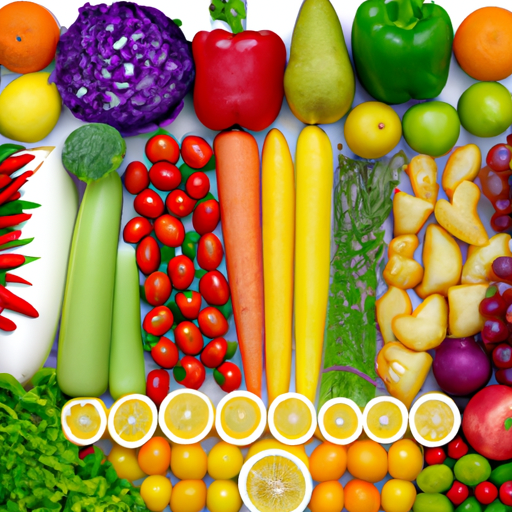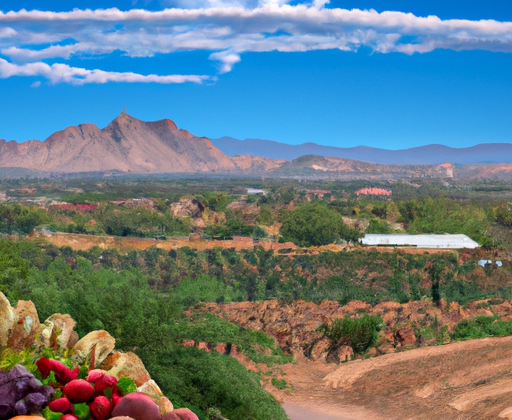Introduction
Have you ever stopped to think about the environmental impacts of the food you eat? Food has a direct relationship with the environment, and it’s up to us to make sure we reduce our ecological footprint by making better food choices. In this post, I’m gonna break down the connection between food and environmental impact and give you some tips on how you can make sustainable food decisions.
Understanding the Connection Between Food and Environment
Food and the environment are connected in numerous ways. While most of us think about our food choices and their impact on our health, there is also a substantial environmental component to consider. How what we eat impacts the planet, including the climate, habitat destruction and water availability, should be part of everyone’s dietary decisions.
The production, transport, distribution and consumption of food all have an impact on the environment. The modern industrial food system has allowed for cheaper and more accessible food, but it’s come at a cost. Intensive farming practices are responsible for deforestation, increased water usage, soil erosion, pollution and other forms of habitat destruction.
Food waste is also a major contributor to the destruction of the environment. Even when food is eaten, it’s often packed in disposable packaging that contributes to litter and pollution. Every year, an estimated one-third of all food produced for human consumption is wasted; that’s 1.3 billion tons annually.
Fortunately, there are steps that can be taken to reduce the environmental impact of food consumption. Sustainable food consumption includes shopping locally, buying organic foods and reducing food waste. Eating seasonally, growing some of your own food and avoiding processed products can also help lessen the burden on the environment.
Ways to Reduce Environmental Impact Through Food Choices
We all want to do our part to save the planet – but our food choices can have a bigger impact than you think! Here are some tips for making sustainable, environmentally-friendly decisions when it comes to what we eat.

First up: shop locally whenever possible. Look into farmers’ markets or groceries that stock locally grown produce. Not only will you be helping out your local community and businesses, you’ll also likely be eating fresher, tastier food. And since it hasn’t been transported across countries (or oceans!), it means far fewer emissions overall.
If you’re looking for sustainability on a more global level, consider investing in organic foods. Growing organically requires less energy from fossil fuels, and is also better for soil health and water conservation. Some people argue that it’s hard to know how “organic” something actually is – but if you can verify its source with the company or farmer selling it, you’re good to go.
Finally, reducing food waste can have a huge environmental benefit. Try to plan out meals ahead of time, so you don’t end up throwing away unused ingredients. Plus, meal prepping helps you save money, too! And if you do end up with leftovers, make sure to store them properly and use them as soon as possible.
Conclusion
It all boils down to this: if we want to reduce our environmental impact and do our part in preserving the planet, we need to be mindful of the food we buy and consume. Shopping locally, purchasing organic products, and reducing food waste are some of the best ways we can make a difference. By being conscious of our choices and making eco-friendly food decisions, we can help ensure a better future for generations to come.
We’ve seen how powerful it can be when we all do our part to protect the environment through sustainable food consumption, and now it’s time for us to take action! Let’s get out there and create a lasting legacy — one where we all contribute to a greener tomorrow. Let’s show the world that by doing right by Mother Nature, we can have a positive, lasting impact on the planet.
Food, Environment, Impact FAQ
How does food impact the environment?
I’m here to talk about the connection between food and environmental impact. It’s a complex issue, one that can’t be ignored any longer. From the point of view of the environment, the choices we make about food matter. Our food choices directly affect the sustainability of resources, water quality, and air quality.
First off, let’s take a look at food production. Growing food requires land, water, energy, and fertilizer. The way we farm directly impacts the environment – for example, if we use more fertilizer than we need, it can run off into rivers, lakes, and oceans and cause water pollution. Intensive farming practices like monocropping and factory farming can also lead to soil degradation and loss of biodiversity.
But food production isn’t the only way food affects the environment. Food waste also has a serious impact. It’s estimated that people in the US waste around 40% of the food they buy – that’s a lot of waste that ends up in landfills, which release methane, a greenhouse gas that’s dangerous for our climate.
In addition, when we ship food around the world, it contributes to carbon emissions. Eating locally-sourced food is a great way to reduce your environmental footprint. Eating plant-based foods, rather than meat and dairy products, is another way to reduce your impact. So the next time you reach for that snack, think twice about how your food choices affect the environment.
How would you describe the relationship between our food choices and environmental issues?
I’d say the relationship between our food choices and environmental issues is pretty clear. We know that the production and distribution of food has a big impact on the environment, from the resources used to make food and the energy used to transport it to our plates, to the amount of waste generated throughout the process.
When you start to consider the full picture, it quickly becomes obvious that our food choices can have a massive influence on the planet’s health. Eating organic and locally sourced foods reduces the amount of pesticides and chemicals used, as well as reducing the amount of energy and resources used to transport it.
But it’s not just about making sure our food choices are sustainable — we also have to make sure we’re being conscious of our food waste. That means being mindful of the amount of food we’re buying and using up, since any food that is thrown away not only adds unnecessary waste to our landfills, but it also takes energy to get it there in the first place.
To sum it up, our food choices can have a huge impact on the environment, from the amount of resources and energy used in production and transportation, to the amount of waste generated from food waste. It’s important for us to be conscious of our food choices and to make sure we’re doing our part to reduce our environmental footprint.
How is food connected to health society the environment and me?
My grub-lovin’ heart has always known that food and environmental impact go hand in hand. Sure, I’ve known that it’s important to reduce my carbon footprint, but I never knew how closely my dietary decisions are connected to the health of the planet – until now.
From the farm’s soil to the ocean’s waves, what we eat has a huge impact on the environment. Ditching processed foods, buying organic, and supporting local farmers (who use sustainable farming practices) are all great steps to take in lessening my carbon footprint. If I really want to make a difference, I can also start composting, reducing food waste, and avoiding red meat, which uses more resources to produce than other proteins.
Food is also very closely connected to our health. What I feed myself on a daily basis can fuel my body and contribute to my physical and mental wellbeing – or it can be a detriment. Eating a variety of fresh, whole foods and staying away from processed stuff is key for keeping my mind and body in optimal shape. And by sticking to eco-friendly tomatoes, apples, and wild-caught salmon, I can take care of myself and the planet at the same time.
So, when it comes to food and environmental impact, there’s a lot more to the conversation than meets the eye! We all have the power to make a difference through our dietary choices – and considering how intertwined the two are, that’s a pretty sweet deal.
food and environmental impact: understanding the connection
Food and environmental impacts are often intertwined and complex. As a journalist, I have looked into the connection between the two, and what I have found is startling. The food we eat has a direct influence on the environment, and vice versa.
For example, the farming of livestock is a major contributor to air pollution, water pollution, and soil degradation. Industrial agriculture is often linked to deforestation, water shortages, and loss of biodiversity. On the other hand, eating fewer animal-based products can reduce negative environmental impacts. A shift towards plant-based diets can also lead to more sustainable farming techniques, and help lessen the strain on resources that are in short supply.
At the same time, the environment can also have an impact on the food that we consume. Pollution and climate change can both lead to changes in food production and availability. For instance, warmer temperatures can create an ideal environment for certain pests, and cause crop damage. Warmer weather can also lead to changes in water resources, which in turn can affect the availability of certain crops.
It’s clear that understanding the connection between food and environmental impact is essential for creating a more sustainable future. As individuals, we should be aware of the impact our food choices have on the planet, and strive to make environmentally friendly decisions whenever possible. This includes things like supporting sustainable farming practices, avoiding overconsumption, and buying local produce whenever possible.

